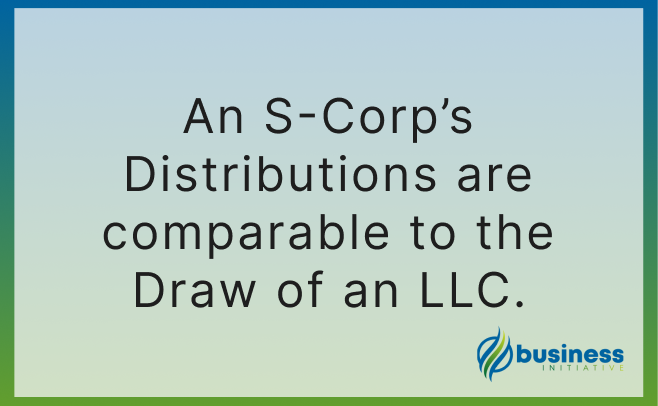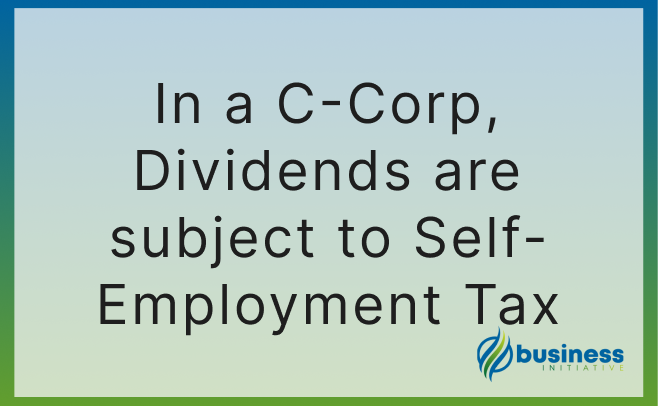Elite Tax Status, Payment Methods, and More…
Upgrading to a specialty tax status changes how you and your taxes are paid.
When you upgrade your LLC to a specialty tax status, you and any other owners are referred to as “Shareholders” instead of as “Members”.
Here are the two options you can choose from:
| LLC | S-Corporation | C-Corporation | |
|---|---|---|---|
| Payment Method | Owners Draw | Salary + Distributions | Salary + Dividends |
| Tax Advantages | None | No Corporate Tax | No Self-Employment Tax |
Upgrading has the potential to save you, and the rest of your company, money by using the unique characteristics of these business entities.
The downside of upgrading is your LLC will have different rules, regulations, and taxes to file. Not only is it a new system, but it’s also more complex.
By electing an S- or C-Corp status, your LLC is first taxed as its own business entity.
Whatever remains is taxed again as personal income to the Owners and Shareholders.
The Default LLC’s simplicity is the biggest advantage over Specialty LLCs.
Upgrading before your business has the capacity to follow higher maintenance and regulatory requirements can cause you to miss out on the tax benefits.
There’s no rush.

If you’re not fully established yet, you could miss out on everything that makes S- and C-Corps worth your while.
Quick Comparison: S-Corp vs C-Corp
Here’s a quick overview of the key differences between S-Corporations and C-Corporations:
| Feature | S-Corporation | C-Corporation |
|---|---|---|
| Ownership Limits | Max 100 shareholders, US citizens only | No restrictions |
| Tax Structure | Pass-through taxation | Double taxation |
| Payment Methods | Salary + Distributions | Salary + Dividends |
| Foreign Ownership | Not allowed | Allowed |
| Stock Classes | One class only | Multiple classes allowed |
| Public Trading | Not possible | Possible |
| Ideal For | Small-medium businesses, service professionals | Startups seeking investment, larger companies |
Now, let’s dive deeper into each type of corporation to help you make the best choice for your business.
S-Corporation
You can upgrade your default LLC to an S-Corporation where owners get paid a combination of a Salary and Distributions.

The S-Corp is generally more popular because you avoid Corporate Tax.
The funny thing is Pass-Through Taxation also gets you out of Corporate Tax but without all the extra rules and regulations.
Just remember: Your LLC should be consistently profitable before upgrading.
Benefits of an S-Corporation
Some states limit the amount of profits Members can take in a default setup.
In an S-Corp, however, there is no limit on how much of the LLC’s profit you and the rest of the Shareholders can receive.
You can optimize your income in an S-Corp and pay less tax by splitting your earnings between salary and distributions.
In a default LLC, Members are only paid in Draws/Distributions.
Since owners contribute to the business, you are exempt from paying Self-Employment Tax on your employee Salary.
The company pays Social Security and Medicare taxes (i.e. Self-Employment Tax) on everyone’s salary.
Being that you are both an Owner and a Shareholder, you’re paying Self-Employment tax on all your Distributions.
The process is very similar to how an employee pays taxes on a salary.
The difference with owners is only their distributions undergo Self-Employment tax, their salaries are exempt.
How you’re taxed depends on whether you work “for” the company or work “on” your company.
S-Corp Requirements
To upgrade to an S-Corporation:
- The IRS limits S-Corps to 100 shareholders
- Shareholders must be US citizens residing in the United States
- Owners can only be people (Not groups, organizations, or other business entities, as they can be in a default LLC)
- Owners must have the same class of stock. Certain shareholders can’t have a higher status or more entitlement than other shareholders
These additional rules create more uniformity within the LLC.
S-Corp Election Forms and Tax Forms
To upgrade your default LLC to a specialty S-Corp, complete and file a 2553 Election Form.
➤ MORE: Upgrade to an S-Corp.
Thankfully, there are plenty of online services available to submit these forms and other documents on your behalf.
They simplify the process and reduce the headache of dealing with government services and bureaucracy.
Once you’re operating as an S-Corp, you’ll use an 1120-S Form to file taxes. This form is similar to the form full-on Corporations use to file taxes.
➤ MORE: Filing taxes as an S-Corporation.
S-Corp in Action
Let’s say Sarah is a freelance graphic designer, who wants to upgrade her business to an S-Corp. Here’s how she could make the best use of an S-corp’s unique features:
1. Tax Benefits As an S-Corp, Sarah can enjoy tax benefits.
Instead of being taxed at the corporate level like a regular C-Corporation, the income generated by the S-Corp “passes through” to Sarah as the owner, and she reports it on her personal tax return.
This avoids the double taxation that C-Corporations may face.
2. Limited Liability Protection: By forming an S-Corp, Sarah gains personal liability protection.
This means that her personal assets are separate from the business’s liabilities.
If the business faces legal issues or debts, Sarah’s personal assets, such as her house or savings, are generally shielded.
3. Credibility and Perpetual Existence: Establishing an S-Corp can enhance Sarah’s business credibility.
Having “Inc.” or “Corp.” after her business name indicates a formal structure, which may appeal to clients and partners.
Additionally, an S-Corp can have perpetual existence, meaning that the business can continue even if Sarah decides to step away or sell her shares.
4. Employee Benefits: As an S-Corp owner, Sarah can receive compensation as a combination of salary and dividends.
She can pay herself a reasonable salary, which is subject to payroll taxes, including Social Security and Medicare.
Additionally, Sarah can receive dividends from the company’s profits, which are not subject to self-employment taxes, potentially resulting in tax savings.
5. Easy Transfer of Ownership: If Sarah wants to bring in partners or transfer ownership to others in the future, an S-Corp structure allows for flexibility.
Ownership interests can be transferred through the sale or transfer of shares, simplifying the process of adding or removing owners.
Looking to stay up-to-date on the latest business trends and strategies?
Look no further than the Business Initiative Newsletter!
Our informative and insightful content will help you navigate the ever-changing business landscape with ease.
From articles on the differences between S-Corps and C-Corps to tips on marketing and sales, our newsletter has it all.
It’s important to note that forming and maintaining an S-Corp requires compliance with legal and regulatory requirements, such as filing articles of incorporation, holding shareholder meetings, and maintaining proper corporate records.
Seeking guidance from a qualified attorney or accountant is recommended to ensure adherence to applicable laws and regulations.
C-Corporation
You can also upgrade your LLC to the specialty C-Corp tax status.
Benefits of C-Corporation
In addition to the salaries, you and the rest of the owners receive Dividends.
Shareholder Dividends are considered personal earnings and are taxed a second time.
This tax is based on your tax bracket so it varies from one person to the next.
Dividends are subject to Self-Employment Tax because only Owners get them.
There is no Self-Employment tax on salaries for either owners or employees.
Even though upgrading to a Corporate Tax Status means paying Double Taxation, one thing you are getting out of is having to pay Self-Employment Tax for your salary, as we just mentioned above.

Double Taxation incentivizes owners to recirculate Dividends within the company.
By keeping this money in the business, you are not taxed a second time.
Dividends left in the business’s account are still subject to Income Tax, even when nobody claims the money.
C-Corp Requirements
The drawback of going C-Corp is your company is required to pay taxes twice.
This is what’s referred to as “Double Taxation”.
The first tax is the 21% Corporate Tax which applies to all company profits.
Your LLC pays Corporate Tax as its own entity.
After paying the Corporate Tax, your LLC pays salaries to you and the other shareholders based on everybody’s proportional contributions to the business.
C-Corp in Action
Let’s consider a quick example where Alex, an entrepreneur, decides to upgrade his tech startup to a C-Corp.
Here’s how he utilizes the special features of a C-Corp:
1. Fundraising and Investment: Alex can raise capital for his startup by seeking investments from venture capitalists and angel investors.
C-Corps are often preferred by investors because they can issue multiple classes of stock, allowing for different levels of ownership and preferred rights.
This flexibility in ownership structure makes it easier for Alex to attract investors and raise funds for his business.
2. Limited Liability Protection: By forming a C-Corp, Alex gains personal liability protection.
This means that his personal assets are typically separate from the liabilities of the business.
If the startup faces legal issues or debts, Alex’s personal assets, such as his house or savings, are generally shielded.
3. Perpetual Existence: A C-Corp can have perpetual existence, meaning that the business can continue even if Alex decides to step away or sell his shares.
This can provide stability and continuity to the startup, even in the event of changes in ownership or leadership.
4. Employee Benefits: C-Corps can offer various employee benefits, such as health insurance, retirement plans, and stock option plans.
Alex can provide competitive compensation packages to attract and retain talented employees, as well as incentivize them through stock options or equity participation, which can align their interests with the long-term success of the company.
5. Tax Planning and Deductions: While C-Corps are subject to double taxation, meaning that the corporate profits are taxed at the corporate level, and any dividends distributed to shareholders are taxed again on their personal tax returns, they can still provide certain tax advantages.
C-Corps have more opportunities for deductible business expenses and can potentially benefit from lower corporate tax rates and deductions not available to other business structures.
6. Exit Strategies: With a C-Corp, Alex can make his startup public through an initial public offering (IPO) or look for buyers.
Public investors and potential acquirers deal with C-Corps regularly, making it easier to navigate such transactions.
It’s important to note that forming and operating a C-Corp involves complying with legal and regulatory obligations, such as filing articles of incorporation, holding regular shareholder meetings, and maintaining proper corporate records.
Seeking guidance from professionals, such as attorneys and accountants, is crucial to ensure compliance and maximize the benefits of a C-Corp structure.
C-Corp Election Forms and Tax Forms
To upgrade your LLC to the specialty C-Corp tax status complete an 8832 Entity Classification Election Form and submit it to the IRS.
➤ MORE: Upgrade your LLC to a C-Corp.
Once you’re all set up with your C-Corp you’ll use an 1120 Form to file taxes.
This is the same form Corporations use to file taxes.
➤ MORE: Filing taxes as a C-Corporation.
Which Structure Is Right for You?
Making the choice between an S-Corporation and C-Corporation depends on your business goals, growth plans, and current situation. Let’s break down which structure might be the best fit for you:
Consider an S-Corporation if:
You Have Consistent Profits
- Your business generates reliable, positive cash flow
- You want to optimize tax savings through salary/distribution split
- You’re looking to reduce self-employment taxes
You Want Simple Ownership
- You prefer a straightforward shareholder structure
- You plan to keep ownership under 100 shareholders
- You want to maintain direct control over business decisions
You’re a US-Based Operation
- All shareholders are US citizens or residents
- You don’t need foreign investment
- Your business operates primarily in the US
You Want Tax Simplicity
- You prefer pass-through taxation
- You want to avoid double taxation
- You’re comfortable with personal income tax rates
Consider a C-Corporation if:
You’re Seeking Major Investment
- You plan to raise venture capital
- You want to attract institutional investors
- You’re considering going public in the future
You Need Flexibility
- You want to offer different classes of stock
- You need to accommodate foreign investors
- You want the option for complex ownership structures
You’re Planning Major Growth
- You expect to expand beyond 100 shareholders
- You’re considering international expansion
- You want to be acquisition-ready
You Want Maximum Benefits
- You plan to offer comprehensive employee benefits
- You want to reinvest profits in the business
- You need the broadest range of tax deductions
Remember: The structure you choose today isn’t permanent. Many successful businesses start as S-Corps and later convert to C-Corps as they grow and their needs change. The key is choosing the structure that best supports your current business stage while aligning with your long-term goals.
FAQs - Frequently Asked Questions About Differences Between S-Corps & C-Corps

What's the main difference between an S-Corp and C-Corp?
S-Corps have pass-through taxation and are limited to 100 US shareholders, while C-Corps face double taxation but have no ownership restrictions.
Learn More...
The fundamental differences between S-Corps and C-Corps lie in their tax treatment, ownership structure, and flexibility.
S-Corporations offer pass-through taxation, meaning profits are only taxed once at the individual level.
C-Corporations face double taxation, with profits taxed at both the corporate level (21% corporate tax) and individual level when distributed as dividends.
- S-Corps are limited to 100 shareholders who must be US citizens or residents
- C-Corps can have unlimited shareholders, including foreign investors
- S-Corps can only issue one class of stock
- C-Corps can issue multiple classes of stock, making them preferred for venture capital
These differences make S-Corps typically better for smaller, domestically-focused businesses, while C-Corps are often chosen by companies planning significant growth or seeking outside investment.
How do I know if my LLC is ready to convert to an S-Corp?
Your LLC is ready when it's consistently profitable and you're paying significant self-employment taxes that could be reduced through salary/distribution optimization.
Learn More...
The decision to convert your LLC to an S-Corp should be based on several key factors.
First, your business should have established, consistent profitability.
You should be earning enough that the tax savings from reducing self-employment taxes would outweigh the additional administrative costs.
- You should be able to pay yourself a reasonable salary
- Your business should have the capacity to handle increased paperwork and compliance requirements
- You should have fewer than 100 potential shareholders
- All owners must be US citizens or residents
The administrative burden includes maintaining proper corporate records, holding regular meetings, and filing additional tax forms.
Consider consulting with a tax professional to analyze your specific situation and potential savings.
What forms do I need to file to convert my LLC to an S-Corp or C-Corp?
For S-Corp conversion, file Form 2553 with the IRS.
For C-Corp conversion, file Form 8832.
Learn More...
The conversion process requires specific IRS forms and timing considerations.
For S-Corporation conversion:
- File Form 2553 (Election by a Small Business Corporation)
- Must file within 2 months and 15 days after the beginning of the tax year the election is to take effect
- All shareholders must sign the election form
For C-Corporation conversion:
- File Form 8832 (Entity Classification Election)
- Follow state-specific requirements for corporate conversion
- Update operating agreements and corporate bylaws
After conversion, S-Corps file annual taxes using Form 1120-S, while C-Corps use Form 1120.
How does double taxation work in a C-Corp?
C-Corps pay a 21% corporate tax on profits, and shareholders pay personal income tax on any dividends received.
Learn More...
Double taxation in C-Corps occurs in two distinct stages.
First Stage: The corporation pays a flat 21% corporate tax rate on all profits.
Second Stage: When profits are distributed as dividends, shareholders pay personal income tax on these distributions.
- Corporate profits are taxed at the entity level (21% rate)
- Distributed dividends are taxed at the shareholder's personal tax rate
- Salary payments are tax-deductible for the corporation
- Retained earnings (profits kept in the business) only face corporate tax
This structure encourages C-Corps to reinvest profits into the business rather than distributing them as dividends.
Companies can minimize double taxation through strategic tax planning and timing of distributions.
What are the advantages of keeping my LLC instead of converting to a corporation?
LLCs offer simpler administration, pass-through taxation, and fewer regulatory requirements.
Learn More...
Default LLCs maintain several significant advantages over corporate structures.
The primary benefits include:
- Simpler tax filing requirements
- Less paperwork and administrative burden
- More flexible profit distribution options
- No required shareholder meetings or corporate minutes
- Lower maintenance costs
LLCs are particularly advantageous for:
- Small businesses with fluctuating income
- Companies that want operational flexibility
- Businesses that don't need to raise capital through stock sales
- Owners who prefer simpler tax reporting
The default LLC structure works well until your business reaches a point where tax savings from corporate structure outweigh the additional complexity.


